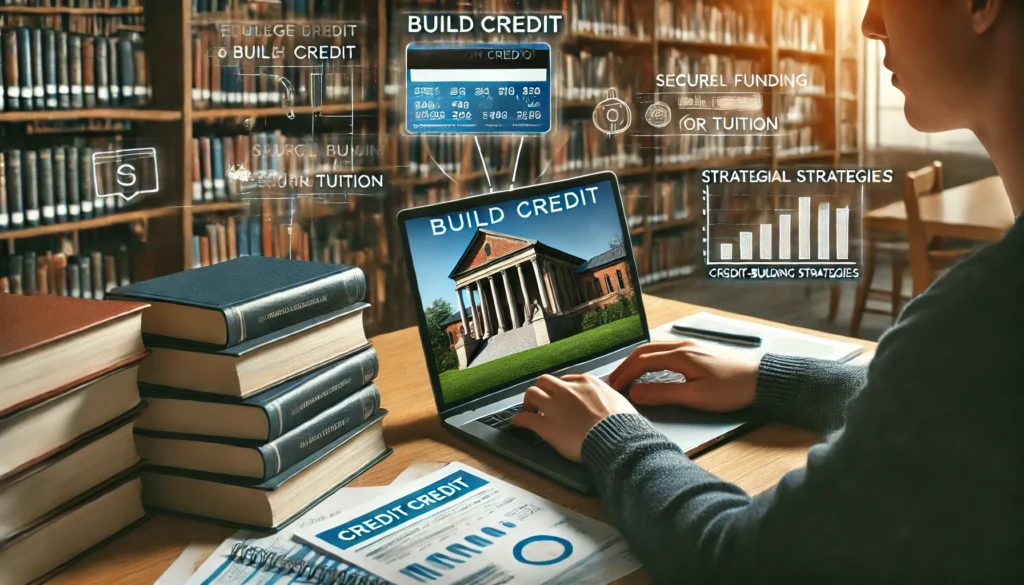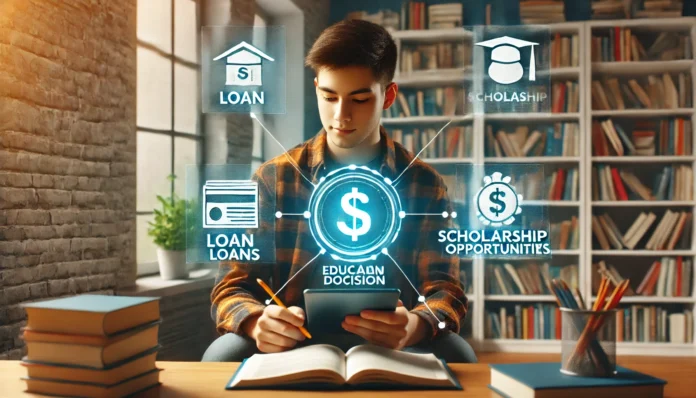Understanding the Challenges of Getting a Student Loan Without a Cosigner
For many aspiring students, financing higher education presents a significant challenge, particularly for those without a creditworthy cosigner. Traditionally, student loans require a cosigner, especially when a borrower lacks a strong credit history. This requirement can be a major roadblock for individuals who do not have access to a willing or qualified cosigner. The good news is that there are alternatives available, ranging from federal student loans to private student loans for bad credit. Understanding these options is crucial for securing funding while also establishing a strong financial foundation for the future.
You may also like: Federal Direct Consolidation Loan: A Smart Strategy to Simplify Student Debt

Exploring Federal Student Loan Options
When considering student loans without a cosigner, federal student loans should be the first option explored. Unlike private lenders, the U.S. Department of Education does not require a credit check or cosigner for most federal student loans. The most common types of federal loans available to students without a cosigner include Direct Subsidized Loans and Direct Unsubsidized Loans. These loans are awarded based on financial need and academic eligibility rather than creditworthiness. This makes them an excellent choice for students with no established credit history. Additionally, federal loans come with borrower protections such as income-driven repayment plans, deferment options, and forgiveness programs, which private student loans may not offer.

Applying for Federal Student Aid
To access federal student loans without a cosigner, students must complete the Free Application for Federal Student Aid (FAFSA). The FAFSA is a crucial step in determining eligibility for financial aid, including grants, work-study programs, and federal student loans. When filling out the FAFSA, applicants provide detailed financial information that helps schools and the federal government determine the amount of aid available. Even if a student believes they may not qualify for need-based assistance, completing the FAFSA is essential, as it ensures access to various funding sources beyond just student loans. Many colleges use FAFSA data to distribute institutional aid as well.

Building Credit to Qualify for Private Student Loans Without a Cosigner
For students who do not qualify for enough federal aid to cover their educational expenses, private student loans without cosigner requirements can be an alternative. However, private lenders typically assess creditworthiness before approving a loan. Since many students have little or no credit history, taking steps to build credit before applying can improve the chances of approval. Opening a secured credit card, making on-time payments, and keeping credit utilization low are effective ways to build credit. Additionally, students should consider becoming authorized users on a parent or guardian’s credit card to establish a credit history without taking on significant debt.
Finding Lenders That Offer No Cosigner Student Loans
While federal loans are the best option for student loans without a cosigner, some private lenders offer loans tailored to students who lack a credit history or cosigner. Companies such as Ascent, MPOWER Financing, and Funding U provide private education loans for bad credit or no credit history. These lenders assess other factors, such as academic performance, projected earnings, and enrollment in an accredited institution. Researching different lenders and comparing interest rates, repayment terms, and borrower protections can help students identify the best private student loans without cosigner requirements.
Exploring Income-Share Agreements as an Alternative
Income-share agreements (ISAs) provide another financing option for students without a cosigner. Instead of taking out a traditional loan, students receive funding in exchange for a percentage of their future income for a set period. ISAs can be particularly beneficial for students in high-demand fields, as repayments are tied to earnings. However, it is essential to carefully review the terms of an ISA, as repayment obligations can extend beyond traditional loan terms depending on the contract.
Seeking Scholarships and Grants to Reduce Loan Dependence
Reducing the overall need for student loans can be achieved by maximizing scholarships and grants. Unlike loans, scholarships and grants do not need to be repaid, making them an ideal way to fund education. Students should apply for as many scholarships as possible, including those offered by colleges, private organizations, and community foundations. Many scholarships target specific demographics, academic achievements, or fields of study, increasing the chances of securing funding. Utilizing scholarship search engines and financial aid offices can help identify opportunities that align with a student’s background and qualifications.
Working While in School to Supplement Educational Costs
For students who wish to minimize their reliance on loans, securing part-time employment while in school can be a viable solution. Many colleges offer work-study programs that provide on-campus jobs to help students cover expenses. Additionally, remote and freelance work opportunities allow students to earn income while maintaining flexible schedules. Balancing work and academics requires careful time management, but even modest earnings can help offset tuition, books, and living expenses.
Exploring State-Based Loan Programs
Many states offer student loan programs with more favorable terms than private lenders. State-based loan programs often provide competitive interest rates and borrower protections similar to federal loans. These programs may be open to residents attending in-state institutions or students enrolled in specific degree programs. Checking with state education agencies or financial aid offices can help students identify additional funding sources that do not require a cosigner.
Managing Student Loans Responsibly to Build Financial Health
Once a student secures a loan, responsible financial management is essential to maintaining good credit and ensuring a smooth repayment process. Setting up automatic payments, budgeting for loan payments after graduation, and exploring refinancing options can help borrowers stay on track. Establishing a positive repayment history not only benefits long-term financial health but also makes it easier to qualify for future credit products, such as auto loans or mortgages.
Frequently Asked Questions (FAQ)
How can I get a student loan without a cosigner?
Securing a student loan without a cosigner can be challenging, but there are several options available. Federal student loans should be your first consideration since they do not require a cosigner and offer favorable repayment terms. If you need additional funding, private student loans without cosigner requirements may be available from certain lenders, particularly those that consider future earning potential rather than credit history. Building your credit score and demonstrating a stable income source can also improve your chances of qualifying for independent student loans with bad credit. Additionally, researching local credit unions or non-traditional lenders that offer educational loans with bad credit can be beneficial.
What are my options for student loans if I have no credit history?
Students without a credit history can still access financial aid through various sources. Federal student loans, such as Direct Subsidized and Unsubsidized Loans, do not require a credit check, making them an ideal choice. For private education loans for bad credit or no credit, lenders may assess your future income potential instead of your credit score. Some online lending platforms specialize in student loans for students without cosigner and no credit by evaluating alternative data like academic performance and employment prospects. Additionally, demonstrating financial responsibility, such as making regular payments on a small credit card or utility bills, can help establish your creditworthiness.
Can I get private student loans for bad credit without a cosigner?
Yes, but it may require extra effort to find the right lender. Many private lenders rely heavily on credit scores, making it difficult to secure private student loans for bad credit without a cosigner. However, some financial institutions and alternative lenders offer non cosigner student loans by assessing factors like educational background, income potential, and field of study. If your credit score is low, consider applying for smaller loan amounts or seeking lenders that cater to students with limited credit histories. Additionally, exploring state-based loan programs or income-share agreements can provide alternative financing options.
What steps can I take to improve my chances of getting an education loan without a cosigner?
To increase your chances of securing an education loan without cosigner support, start by building your credit profile. This can be done by responsibly using a credit card, paying bills on time, and reducing existing debts. Research lenders that specialize in student loans for students without cosigner requirements and understand their eligibility criteria. Demonstrating a stable income source, part-time employment, or strong academic performance can also work in your favor. Exploring scholarships, grants, and work-study programs can help reduce the amount you need to borrow and make you a less risky candidate for lenders.
What should I look for in private loans with no cosigner requirements?
When comparing private loans with no cosigner requirements, focus on interest rates, repayment terms, and borrower benefits. Some lenders offer competitive interest rates based on earning potential rather than credit scores. Look for flexible repayment options, such as deferment or income-based repayment plans, which can help manage payments after graduation. Understanding the total cost of the loan, including origination fees and penalties, is essential. Choosing the best student loans without cosigner obligations also means checking customer service reviews and lender reputations to ensure you’re borrowing from a reliable provider.
Are emergency student loans available for students without credit and cosigner?
Yes, some lenders provide emergency student loans no cosigner requirements, which can be useful in urgent financial situations. These loans are typically short-term and may have higher interest rates than traditional student loans. Schools sometimes offer emergency funding or institutional loans to help students facing financial hardships. Additionally, online lending platforms cater to students in need of quick funding without requiring extensive credit checks. If you’re in a financial emergency, contacting your school’s financial aid office to explore all available options is a smart first step.
How do private student loans for students with no cosigner differ from federal student loans?
Private student loans for students with no cosigner often come with different eligibility requirements and repayment terms than federal student loans. Federal loans offer fixed interest rates, flexible repayment plans, and forgiveness programs, making them the preferred choice for most borrowers. In contrast, private education loans for bad credit may have variable interest rates and less forgiving repayment structures. Some private lenders assess future income potential rather than credit history, which can be beneficial for students without credit. Understanding these differences can help you make an informed decision about which loan type best suits your financial needs.
Can you get a student loan without a cosigner if you have bad credit?
Yes, but it requires strategic planning. While federal student loans do not consider credit scores, private student loans for bad credit often require alternative criteria for approval. Some lenders specialize in student loans bad credit no cosigner requirements by evaluating education level, income potential, or even employment guarantees. Working on improving your credit score before applying or seeking out lenders that offer loans without cosigner requirements can also improve your chances. Additionally, demonstrating financial responsibility through a consistent income or steady bill payments can help prove your reliability as a borrower.
What options are available for students who need school loans for bad credit?
Students with bad credit have multiple financing options, including federal student loans, income-share agreements, and private student loans designed for those with limited credit histories. School loans for bad credit may also be available from credit unions or specialized lenders that focus on educational financing rather than traditional credit assessments. Some states offer loan programs specifically designed for students with poor credit, providing more accessible repayment terms. Exploring scholarships and grants can also reduce the amount you need to borrow. Researching all available financial aid opportunities is essential for making an informed decision.
How can independent students with bad credit secure student loans?
Independent student loans bad credit options exist, but they may require additional effort to obtain. Federal student loans remain the best choice, as they do not require a credit check. Private lenders may consider future earning potential, so choosing a high-demand field of study can improve your eligibility. Some financial institutions offer student loans without credit check requirements for students demonstrating strong academic performance or stable employment. Seeking financial counseling and exploring alternative funding sources like crowdfunding or employer-sponsored tuition assistance programs can also help independent students finance their education.
Conclusion
Obtaining a student loan without a cosigner may seem challenging, but a variety of options exist to make higher education accessible. Federal student loans remain the best starting point due to their borrower protections and accessibility, but private student loans without cosigner requirements can also be viable under the right circumstances. By building credit, researching lenders, applying for scholarships, and exploring alternative funding sources, students can secure the necessary financial resources to achieve their academic goals. Making informed decisions about borrowing and repayment strategies will ensure long-term financial stability and success.
student loan options, education financing, financial aid strategies, student credit building, loan repayment tips, FAFSA application process, private lending alternatives, student financial independence, scholarship search, federal vs. private loans, work-study programs, income-share agreements, credit-building for students, student debt management, educational grants, responsible borrowing, state financial aid programs, best student loan strategies, higher education funding, student financial planning
Further Reading:
Options for repaying your Parent PLUS loans
How to Use the Double Consolidation Loophole for Student Loans
How to Get Ahead of Your Student Debt
The information provided in this article is for general informational purposes only and is not intended to constitute financial, investment, legal, tax, or other professional advice. The content should not be relied upon for making any financial or investment decisions. Readers are encouraged to consult with licensed professionals, such as financial advisors, attorneys, or tax experts, to obtain personalized advice tailored to their individual circumstances. The author and publisher disclaim any liability for any actions taken or not taken based on the information provided in this article.





